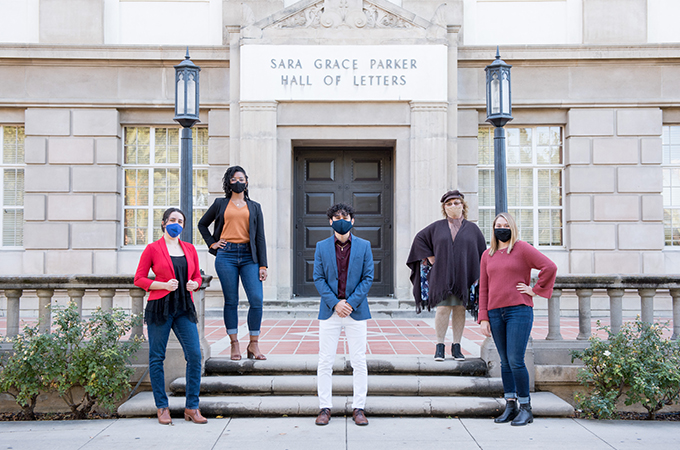When University of Redlands School of Education courses transferred to an online modality last March in response to the COVID-19 pandemic, a group of graduate students felt uncertain about their academic futures. But instead of becoming discouraged, they gathered together and formed a Graduate Student Association (GSA), which allows them to bring attention to issues they and their peers are facing.
“We realized we didn’t have a formal avenue for advocacy,” says Kevin Velez ’21, president of the GSA. “If any concerns were to come up in the future, we didn’t know how those would be addressed in a constructive way.”
The group’s vice president, Chanel Parrish ’21, notes the reaction to the GSA has been positive and conversations—such as meetings with former Naslund Endowed Dean Andrew Wall and current Naslund Endowed Dean Mario Martinez—have focused on the wellbeing of graduate students.
“We want to be really aware of who we’re serving,” Parrish says. “Early on, we were advocating for the CARES Act, undocumented students, and the needs and mental health of our Black students during the time when George Floyd was murdered. All of those things were on the very top of our list.”
In addition to advocacy, communication and collaboration are the group’s other two goals, which, Velez says, align with the School of Education’s foundational pillars of educational justice and accessibility. In addition to improving communication between students in different programs, the group has facilitated meetings between faculty members and students that have addressed questions about curriculum.
“We might have a good idea as students, but if we don't get faculty, staff members, or administration on board, those ideas aren’t going to go anywhere,” says Velez. “We really want to make sure that all the stakeholders know that we have a place in this process, and we have a responsibility to make sure that we see this thing through.”
Associate Director of the Office of Student Success Yessenia Yorgesen, who is currently advising the group, is among the administrators who appreciates the role the new organization can play, as well as the students behind it. “These students have shown an incredible amount of initiative, dedication, and an overall desire to create an organization that will include all student voices,” she says. “Their drive and passion for creating an organization that will be sustainable has impressed many of us in the School of Education.”
In addition to Velez and Parish, three other students—Emilia Cline Arellano '21, Stephanie Rudd ’21, and Mary-Jean Stevenson ’21—sit on the organization’s cabinet.
Cline Arellano, who was discouraged to learn that a graduate student association didn’t exist at the U of R when she arrived, appreciates how, in addition to bridging to gap to faculty and administrators, the GSA provides a platform for connecting: “Having a place where students are available to make connections for each other can be really beneficial.”
Cline Arellano also notes that, in forming the group, its members have incorporated systems they learned in their respective programs, “I’m taking a curriculum and instruction class and we’re learning how to create a school-wide programming model,” she says. “It just so happens that the GSA has the four criteria to be successful—it was great to learn that we have a supportive theoretical framework.”
Currently, the group meets biweekly and has been reaching out to graduate students to encourage participation. In the future, GSA group members hope to collaborate with other clubs and organizations. Eventually, they hope the group expands to include all graduate students at the U of R—not just those from the School of Education.
“I think that's one of the clearest ways that [the GSA] embodies educational justice and accessibility,” says Velez. “By allowing students to use their own voices and then amplifying their perspectives.”
Learn more about the School of Education.






